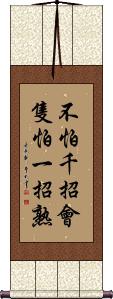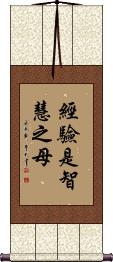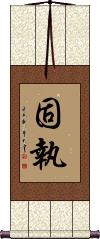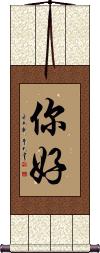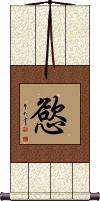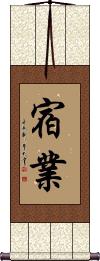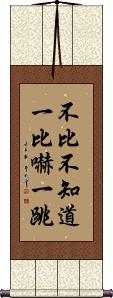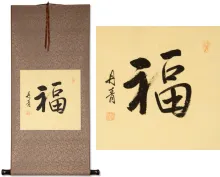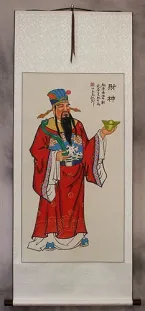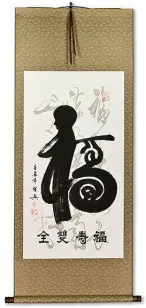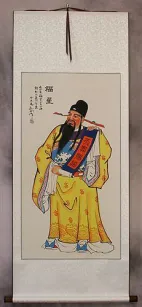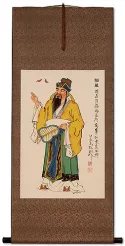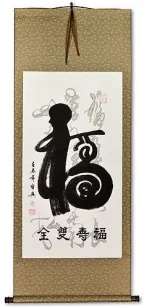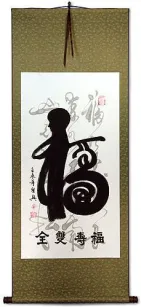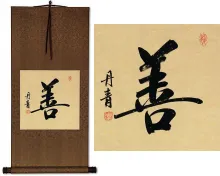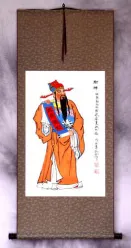Many custom options...
And formats...

Not what you want?
Try other similar-meaning words, fewer words, or just one word.
Good and Bad in Chinese / Japanese...
Buy a Good and Bad calligraphy wall scroll here!
Personalize your custom “Good and Bad” project by clicking the button next to your favorite “Good and Bad” title below...
1000 good moves ruined by 1 bad
不怕千招会只怕一招熟 is a Chinese proverb that literally translates as: Do not worry about making a thousand clever moves; what [one has to] fear is one bad move.
Figuratively, this means: Even if you have made many clever moves before, one wrong move will ruin the whole game.
I compare this to the English saying, “It takes only one Aw-shit to wipe out a thousand Attaboys.”
Experience is the Mother of Wisdom
It's been said that wisdom comes from good judgment, and good judgment comes from experience, while experience comes from a series of times when you used bad judgment.
經驗是智慧之母 is a Chinese proverb that makes the simplest connection between experience and wisdom.
See Also: Failure is the Mother of Success | Wisdom | Learn From Wisdom
Persistence
固執 can also mean “opinionated” or “stubborn” in Chinese and Japanese, but in the nicest way possible (still bad).
This just means “stubborn” in Korean (not a good scroll if your audience is Korean, in fact, we don't recommend this word at all). There are better ways to express this idea, such as tenacity/tenacious or perseverance... ...see the links below...
See Also: Tenacious | Fortitude | Perseverance
Hello / Ni Hao
你好 is the day-to-day way to say hello in Chinese.
The characters literally mean, “You good?” It's the equivalent of “What's up?” in English, where nobody expects an actual answer.
This explanation is here for educational purposes only. 你好 is an oral word that is not appropriate for a scroll (not a bad meaning, just very odd for a wall scroll).
Desire / Longing / Craving
慾 means desire, longing, appetite, wish, covetousness, greed, passion, desire, avarice, and craving.
慾 is universal in Chinese, Japanese Kanji, and Korean Hanja.
The context in which this character is used determines whether the meaning is good or bad. As a single character on a wall scroll, you get to decide what the definition is to you (hopefully more toward desire than greed).
![]() Please note that Japanese use a simplified version of this character - it also happens to be the same simplification used in mainland China. Click on the character to the right if you want the Japanese/Simplified version of desire.
Please note that Japanese use a simplified version of this character - it also happens to be the same simplification used in mainland China. Click on the character to the right if you want the Japanese/Simplified version of desire.
Karma (of your past lives)
宿業 is the Buddhist concept of Past Karma. Simply put, it's the sum of all the good and bad from all previous lives (perhaps earlier in your current life). This term is not commonly used outside of the Buddhist faith (you'll have a tough time finding a non-Buddhist Asian person that knows this word).
Other ways to translate this are “The karma of previous existence,” “The karma remaining from prior existences,” or simply “Former karma.”
See Also: Buddhism
Comparison Leads to Truth and Enlightenment
不比不知道一比吓一跳 is a Chinese proverb that literally means: [If one not does] not make comparisons, [one will] not know [the truth] when [one] compares, [one will be] greatly surprised.
This goes to the idea that if you do not know bad times, you cannot know what good times are.
...And...
You can not know light without experiencing darkness.
Another way to translate this would be: If you wish to be enlightened, you need to make comparisons and analyze every aspect (of a situation, issue, or problem).
This in-stock artwork might be what you are looking for, and ships right away...
Gallery Price: $31.00
Your Price: $16.88
Gallery Price: $65.00
Your Price: $39.88
Gallery Price: $90.00
Your Price: $49.88
Good Fortune / Prosperity Saint Wall Scroll
Discounted Blemished
Gallery Price: $71.00
Your Price: $39.00
Good Luck Special Calligraphy Wall Scroll
Discounted Blemished
Gallery Price: $53.00
Your Price: $29.00
Handmade Good Luck Special Calligraphy Wall Scroll
Discounted Blemished
Gallery Price: $35.00
Your Price: $19.00
Unique Good Luck Special Calligraphy Wall Scroll
Discounted Blemished
Gallery Price: $31.00
Your Price: $17.00
Decorative Good Luck Special Calligraphy Wall Scroll
Discounted Blemished
Gallery Price: $31.00
Your Price: $17.00
Gallery Price: $65.00
Your Price: $39.88
Not the results for Good and Bad that you were looking for?
Below are some entries from our dictionary that may match your Good and Bad search...
| Characters If shown, 2nd row is Simp. Chinese |
Pronunciation Romanization |
Simple Dictionary Definition |
業 业 see styles |
yè ye4 yeh waza わざ |
More info & calligraphy: Karmadeed; act; work; performance; (personal name) Hajime karman, karma, "action, work, deed"; "moral duty"; "product, result, effect." M.W. The doctrine of the act; deeds and their effects on the character, especially in their relation to succeeding forms of transmigration. The 三業 are thought, word, and deed, each as good, bad, or indifferent. Karma from former lives is 宿業, from present conduct 現業. Karma is moral action that causes future retribution, and either good or evil transmigration. It is also that moral kernel in which each being survives death for further rebirth or metempsychosis. There are categories of 2, 3, 4, 6, and 10; the 六業 are rebirth in the hells, or as animals, hungry ghosts, men, devas, or asuras: v. 六趣. |
道 see styles |
dào dao4 tao wataru わたる |
More info & calligraphy: Daoism / Taoism(1) (abbreviation) (See 道・みち・1) road; path; street; route; (2) (See 道・みち・5) way; set of practices; rules for conducting oneself; (3) (abbreviation) (in Japanese schools) (See 道徳教育) moral education; (4) Buddhist teachings; (5) Taoism; (6) administrative region of Japan (Hokkaido); (7) (hist) administrative region of Japan (Tokaido, Tosando, etc.); (8) province (administrative region of Korea); (9) circuit (administrative region of China); (10) (hist) province (Tang-era administrative region of China); (personal name) Wataru mārga. A way, road; the right path; principle, Truth, Reason, Logos, Cosmic energy; to lead; to say. The way of transmigration by which one arrives at a good or bad existence; any of the six gati, or paths of destiny. The way of bodhi, or enlightenment leading to nirvāṇa through spiritual stages. Essential nirvāṇa, in which absolute freedom reigns. For the eightfold noble path v. 八聖道.; The two Ways: (1) (a) 無礙道 or 無間道 The open or unhindered way, or the way of removing all obstacles or intervention, i. e. all delusion; (b) 解脫道 the way of release, by realization of truth. (2) (a) 難行道 The hard way of "works", i. e. by the six pāramitā and the disciplines. (b) 易行道 the easy way salvation, by the invocation of Amitābha. (3) (a) 有漏道 The way of reincarnation or mortality; (b) 無漏 the enlightened way of escape from the miseries of transmigration. (4) (a) 教道 The way of instruction; (b) 證道 the way of realization. (5) The two lower excretory organs. |
ジンクス see styles |
jinkusu ジンクス |
More info & calligraphy: Jinx |
三性 see styles |
sān xìng san1 xing4 san hsing sanshō |
The three types of character 善, 惡, 無記 good, bad and undefinable, or neutral; v. 唯識論 5. Also, 徧依圓三性 the three aspects of the nature of a thing— partial, as when a rope is mistaken for a snake; only partly reliable, i.e. incomplete inference, as when it is considered as mere hemp; all around, or perfect, when content, form, etc., are all considered. |
不善 see styles |
bù shàn bu4 shan4 pu shan fuzen ふぜん |
bad; ill; not good at; not to be pooh-poohed; quite impressive evil; sin; vice; mischief Not good; contrary to the right and harmful to present and future life, e. g. 五逆十惡. |
不賴 不赖 see styles |
bù lài bu4 lai4 pu lai |
(coll.) not bad; good; fine |
不錯 不错 see styles |
bù cuò bu4 cuo4 pu ts`o pu tso |
correct; right; not bad; pretty good |
五因 see styles |
wǔ yīn wu3 yin1 wu yin goin |
The five causes, v. 倶舍論 7. i. e. (1) 生因 producing cause; (2) 依因supporting cause; (3) 立因 upholding or establishing cause; (4) 持因 maintaining cause; (5) 養因 nourishing or strengthening cause. These all refer to the four elements, earth, water, fire, wind, for they are the causers or producers and maintainers of the infinite forms of nature. Another list from the Nirvana-Sutra 21 is (1) 生因 cause of rebirth, i. e. previous delusion; (2) 和合因 intermingling cause, i. e. good with good, bad with bad, neutral with neutral; (3) 住因 cause of abiding in the present condition, i. e. the self in its attachments; (4) 增長因 causes of development, e. g. food, clothing, etc.; (5) 遠因 remoter cause, the parental seed. |
優劣 优劣 see styles |
yōu liè you1 lie4 yu lieh yuuretsu / yuretsu ゆうれつ |
good and bad; merits and drawbacks (relative) merits; superiority or inferiority; quality superior and inferior |
功罪 see styles |
gōng zuì gong1 zui4 kung tsui kouzai / kozai こうざい |
achievements and crimes merits and demerits; good points and bad points; strengths and weaknesses |
匂う see styles |
niou / nio におう |
(v5u,vi) (1) to be fragrant; to smell (good); (2) to stink; to smell (bad); (3) to glow; to be bright; (4) to smack of; to show hints of |
口占 see styles |
kuchiura くちうら |
(1) determining a speaker's true or hidden meaning; determining a speaker's intentions from his manner of speech; (2) (archaism) divining good or bad luck from listening to someone |
口裏 see styles |
kuchiura くちうら |
(1) determining a speaker's true or hidden meaning; determining a speaker's intentions from his manner of speech; (2) (archaism) divining good or bad luck from listening to someone |
可以 see styles |
kě yǐ ke3 yi3 k`o i ko i ka i |
can; may; possible; able to; not bad; pretty good can |
吉凶 see styles |
jí xiōng ji2 xiong1 chi hsiung kikkyou / kikkyo きっきょう |
good and bad luck (in astrology) good or bad luck; fortune fortune and misfortune |
啞羊 哑羊 see styles |
yǎ yáng ya3 yang2 ya yang ayō |
(啞羊僧) A dumb sheep (monk), stupid, one who does not know good from bad, nor enough to repent of sin. |
好壞 好坏 see styles |
hǎo huài hao3 huai4 hao huai |
good or bad; good and bad; standard; quality; (coll.) very bad |
好惡 好恶 see styles |
hào wù hao4 wu4 hao wu kōaku |
lit. likes and dislikes; preferences; taste good things and bad things |
好歹 see styles |
hǎo dǎi hao3 dai3 hao tai |
good and bad; most unfortunate occurrence; in any case; whatever |
定分 see styles |
dìng fèn ding4 fen4 ting fen |
predestination; one's lot (of good and bad fortune) |
定散 see styles |
dìng sàn ding4 san4 ting san jōsan |
A settled, or a wandering mind; the mind organized by meditation, or disorganized by distraction. The first is characteristic of the saint and sage, the second of the common untutored man. The fixed heart may or may not belong to the realm of transmigration; the distracted heart has the distinctions of good, bad, or indifferent. |
定業 定业 see styles |
dìng yè ding4 ye4 ting yeh teigyou / tegyo ていぎょう |
regular employment Fixed karma, rebirth determined by the good or bad actions of the past. Also, the work of meditation with its result. |
差勁 差劲 see styles |
chà jìn cha4 jin4 ch`a chin cha chin |
bad; no good; below average; disappointing |
悪友 see styles |
akuyuu / akuyu あくゆう |
(1) (See 良友) undesirable friend; bad company; bad companion; bad influence; (2) partner-in-crime (i.e. good friend); close friend; buddy |
悪運 see styles |
akuun / akun あくうん |
(1) undeserved good luck; luck of the devil; dumb luck; (2) bad luck |
業因 业因 see styles |
yè yīn ye4 yin1 yeh yin gouin / goin ごういん |
karma The deed as cause; the cause of good or bad karma. |
無記 无记 see styles |
wú jì wu2 ji4 wu chi mugi |
? avyākṛta, or avyākhyāta. UnrecordabIe (either as good or bad); neutral, neither good nor bad; things that are innocent or cannot be classified under moral categories. Cf. 三性. |
玉石 see styles |
yù shí yu4 shi2 yü shih tamaishi たまいし |
jade; jade and stone; (fig.) the good and the bad pebble; round stone; boulder; (surname) Tamaishi |
珉玉 see styles |
mín yù min2 yu4 min yü |
good and bad; expensive and cheap |
眞如 see styles |
zhēn rú zhen1 ru2 chen ju shinnyo しんにょ |
(surname) Shinnyo bhūtatathatā, 部多多他多. The眞 is intp. as 眞實 the real, 如 as 如常 thus always or eternally so; i.e. reality as contrasted with 虛妄 unreality, or appearance, and 不變不改 unchanging or immutable as contrasted with form and phenomena. It resembles the ocean in contrast with the waves. It is the eternal, impersonal, unchangeable reality behind all phenomena. bhūta is substance, that which exists; tathatā is suchness, thusness, i.e. such is its nature. The word is fundamental to Mahāyāna philosophy, implying the absolute, the ultimate source and character of all phenomena, it is the All. It is also called 自性淸淨心 self-existent pure Mind; 佛性 Buddha-nature; 法身 dharmakāya; 如來藏 tathāgata-garbha, or Buddha-treasury; 實相 reality; 法界 Dharma-realm; 法性Dharma-nature; 圓成實性 The complete and perfect real nature, or reality. There are categories of 1, 2, 3, 7, 10, and 12 in number: (1) The undifferentiated whole. (2) There are several antithetical classes, e.g. the unconditioned and the conditioned; the 空 void, static, abstract, noumenal, and the 不 空 not-void, dynamic, phenomenal; pure, and affected (or infected); undefiled (or innocent), i.e. that of Buddhas, defiled, that of all beings; in bonds and free; inexpressible, and expressible in words. (3) 無相 Formless; 無生 uncreated; 無性 without nature, i.e. without characteristics or qualities, absolute in itself. Also, as relative, i.e. good, bad, and indeterminate. (7, 10, 12) The 7 are given in the 唯識論 8; the 10 are in two classes, one of the 別教 cf. 唯識論 8; the other of the 圓教, cf. 菩提心義 4; the 12 are given in the Nirvana Sutra. |
Click here for more Good and Bad results from our dictionary
The following table may be helpful for those studying Chinese or Japanese...
| Title | Characters | Romaji (Romanized Japanese) | Various forms of Romanized Chinese | |
| 1000 good moves ruined by 1 bad | 不怕千招會隻怕一招熟 不怕千招会只怕一招熟 | bú pà qiān zhāo huì zhǐ pà yī zhāo shú bu2 pa4 qian1 zhao1 hui4 zhi3 pa4 yi1 zhao1 shu2 bu pa qian zhao hui zhi pa yi zhao shu | pu p`a ch`ien chao hui chih p`a i chao shu pu pa chien chao hui chih pa i chao shu |
|
| Experience is the Mother of Wisdom | 經驗是智慧之母 经验是智慧之母 | jīng yàn shì zhì huì zhī mǔ jing1 yan4 shi4 zhi4 hui4 zhi1 mu3 jing yan shi zhi hui zhi mu jingyanshizhihuizhimu | ching yen shih chih hui chih mu | |
| Persistence | 固執 固执 | koshuu / koshu | gù zhí / gu4 zhi2 / gu zhi / guzhi | ku chih / kuchih |
| Hello Ni Hao | 你好 | nǐ hǎo / ni3 hao3 / ni hao / nihao | ||
| Desire Longing Craving | 慾 欲 | yoku | yù / yu4 / yu | yü |
| Karma (of your past lives) | 宿業 宿业 | shukugou / shukugo | sù yè / su4 ye4 / su ye / suye | su yeh / suyeh |
| Comparison Leads to Truth and Enlightenment | 不比不知道一比嚇一跳 不比不知道一比吓一跳 | bù bǐ bù zhī dào yī bǐ xià yì tiào bu4 bi3 bu4 zhi1 dao4 yi1 bi3 xia4 yi4 tiao4 bu bi bu zhi dao yi bi xia yi tiao | pu pi pu chih tao i pi hsia i t`iao pu pi pu chih tao i pi hsia i tiao |
|
| In some entries above you will see that characters have different versions above and below a line. In these cases, the characters above the line are Traditional Chinese, while the ones below are Simplified Chinese. | ||||
Successful Chinese Character and Japanese Kanji calligraphy searches within the last few hours...
